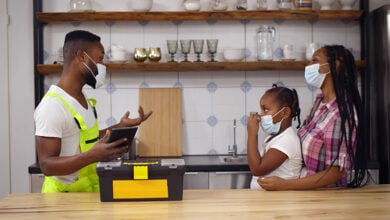Campaigning for more inclusive language in the trade industry, starting in school career advice
6 September 2022
We, at Rated People, are highlighting the need for greater diversity, inclusion and equity in the trades industry, and want to make it easier for more people, regardless of gender, ethnicity or sexuality to get into the industry and thrive.
In the context of the worst workforce shortages in history, Britain needs all the talent it can get right now – from plumbers to electricians and bricklayers to roofers.
But the trades industry is far from inclusive – it still uses outdated gendered job titles like ‘tradesmen’ as a collective term to describe ALL people, perpetuating inaccurate stereotypes and excluding anyone who doesn’t associate as such.

We know from a recent piece of research that over 40% (42%) of 16-18-year-olds say they would be more likely to consider a career in the trades industry if more inclusive language was used in career advice.
So, we are now calling for an end to using gendered terms in UK school career advice, and for changing content to avoid the preconceived gendering of jobs.
Why are we doing this?
In short, it’s the right thing to do.
Non-inclusive language is affecting our trades workforce today and the next generation – it needs to change if we want Britain to thrive.
We interviewed 3,000 UK residents, tradespeople and 16-18-year-old school leavers to uncover how much binary, non-inclusive language, like ‘tradesmen’ is still being used and what effect it’s having.

Our research showed 80% of UK residents still use the term ‘tradesmen’ to refer to all people working within the industry.
Gendered language is also still being used in career advice in school – 73% of 16–18-year-olds say they heard the term ‘tradesmen’ within careers advice as a collective term for all people who work in the industry, but just one in 10 (11%) heard the term ‘tradespeople’ very frequently when receiving career advice at school.
The effect of this is that so many young people who don’t fit the ‘traditional tradesmen’ stereotype never think of a trade profession as a viable career path – the industry and the opportunities in it are closed off.
The fact that 42% of 16-18-year-olds say they would be more likely to consider a career in the trades industry if more inclusive language was used just goes to show how powerful language is.
A change to using more inclusive language will positively influence future generations when it comes to making career choices. If non-binary inclusive language helps people of all genders to even consider entering this field of work in the future, then the next generation of tradespeople could be a lot more diverse.
Homeowners want to see change
Looking at the UK as a whole, there is a demand for change; the biggest motivation for this change is to break down the stereotypes, with 52% of people agreeing that this is the most important reason.
The second biggest reason for British homeowners is that it gives a fairer representation of the entire workforce.
Tradespeople want to see change
There’s also huge support for a more diverse workforce among existing tradespeople within the industry – almost nine in 10 (87%) tradespeople think it would be good for more women to start working in the industry.

Over half (51%) of British tradespeople think people should start using ‘tradespeople’ instead of ‘tradesmen’ when referring to all people who work in the industry. And only 30% said they don’t think we should adopt the more inclusive term ‘tradespeople.’ The rest being unsure.
The main driving force for change from tradespeople’s perspective is that 55% believe it would be a good way to encourage people into the industry.
The next generation definitely wants to see change
Two in three (66%) 16-18-year-olds think ‘tradesmen’ as a collective term should be replaced with ‘tradespeople’ in career advice as a way of becoming more inclusive and less gendered. Of those that want change to happen, more girls want to see a change than boys with 69% of girls agreeing and 60% of boys.

The top UK cities where 16–18-year-olds want change:
1. Belfast: 88% (of 16-18-year-olds say the term ‘tradespeople’ should be used as a collective term for all people in the industry)
2. Brighton: 86% = Edinburgh = 86%
3. Sheffield: 83%
4. Glasgow: 80%
5. Liverpool: 75%
6. Norwich: 74%
7. Nottingham: 73% = Plymouth: 73%
8. Newcastle: 72%
9. Birmingham: 64%
10. London: 63%
Half of those surveyed (50%) agreed the biggest reason gender-neutral language should be used to describe tradespeople in career advice is that ‘tradesmen’ maintains an inaccurate stereotype of tradespeople just being men.
How trade careers are communicated in career advice
Our research also showed that less than half (42%) of 16–18-year-old girls were offered a trade job in career advice at school, compared to more than two thirds (65%) of boys.
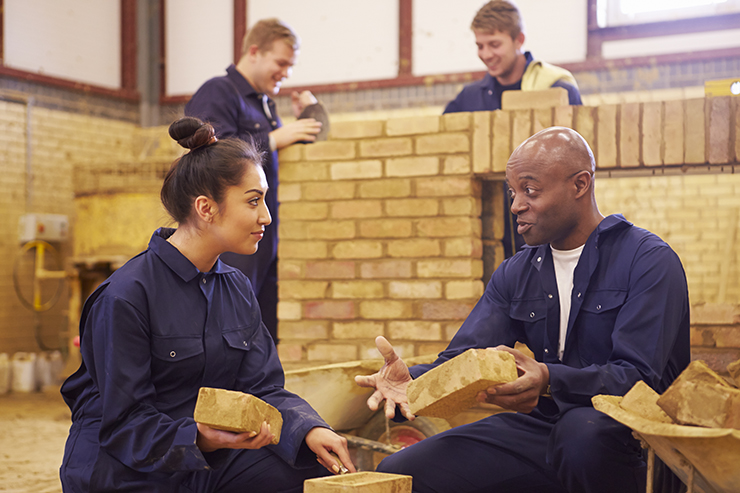
When looking at how this compares in different areas, there’s a stark contrast in career advice across the UK. In some areas, only 14% of 16–18-year-olds were offered a trade profession as a viable career option.
Given that just 4% of school-leavers opted for an apprenticeship last year (according to Government reports), it’s obvious that more can be done to promote trade careers to young people.
The cities where career advice in schools promotes trade professions the least:
- Brighton = 14% (of 16–18-year-olds had a trade profession communicated to them as an option)
- Newcastle – 32%
- Glasgow = 33%
- Liverpool = 42%
- Southampton = 47%
The cities where career advice in schools promotes trade professions the most:
- Plymouth = 82% (of 16–18-year-olds had a trade profession communicated to them as an option)
- Sheffield = 78%
- Belfast = 75%
- Edinburgh = 57%
- Nottingham = 55%
For an industry that offers great financial security and job fulfilment, more needs to be done to ensure young people see this as a welcoming environment where they can flourish – where everybody, regardless of gender, race, or sexuality, can thrive.
What else is Rated People doing to promote diversity?
To show we’re really putting our money where our mouth is, we’re also launching a new nationwide TV campaign to further promote the diversity message. The newly launched advert shows ‘if you’ve got the skills, we’ve got the jobs’ to highlight the most important thing is how skilled you are, and nothing else.
To show this, the TV advert intentionally features tradespeople from a first-hand perspective, showing the work they’re doing, and not who they are, or what they look like. Rated People hopes the advert will show no one judges a skilled pair of hands for who they are, they just care they’re doing a good job, the 5-star kind of job.
The campaign is supported by a series of billboard adverts, led with witty copy aiming to create awareness about the unconscious bias people may have when thinking about what tradespeople ‘look like’. Again, the focus is on reminding people that what’s important, and what people should care about in a tradesperson, is not what they look like or sound like, but how well they do their job.
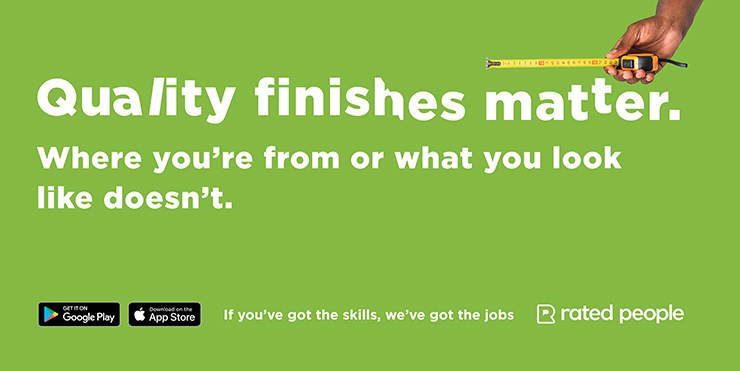
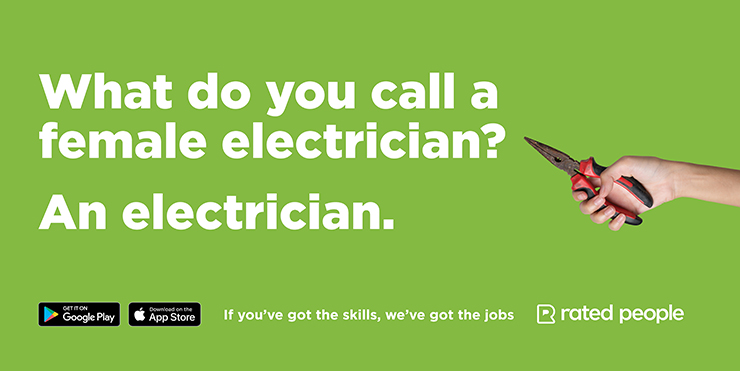
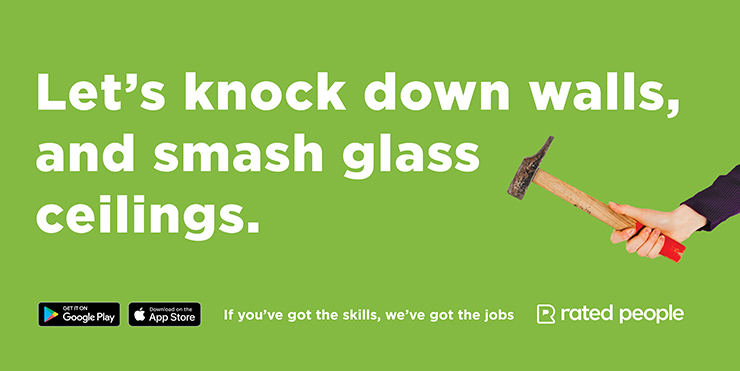
The campaign is supported by a radio ad, social media take over, online display, influencer and partnerships with Brand Ambassador Nic Hamilton, car racing driver, The Register of Tradeswomen and Jewson to further promote the diversity message.
Read more about our campaign here.
Alongside the research and the national brand campaign, we’re also calling for change by making 16th September 2022 the first ‘National Tradespeople Day’ – renaming the antiquated ‘National Tradesmen Day’ to better reflect ALL the amazing people who work in the industry.
Methodology
- References to ‘women’ throughout this research and press release are inclusive and refer to all who identify as women
- Nationwide survey completed with Censuswide, to 2,001 UK residents aged 16 and above
- Nationwide tradespeople survey, completed with Rated People to 412 UK tradespeople, aged 18 and above
- Nationwide survey completed with Censuswide, to 501 16-18 year olds about careers advice they received at school
- Research complete August 2022

